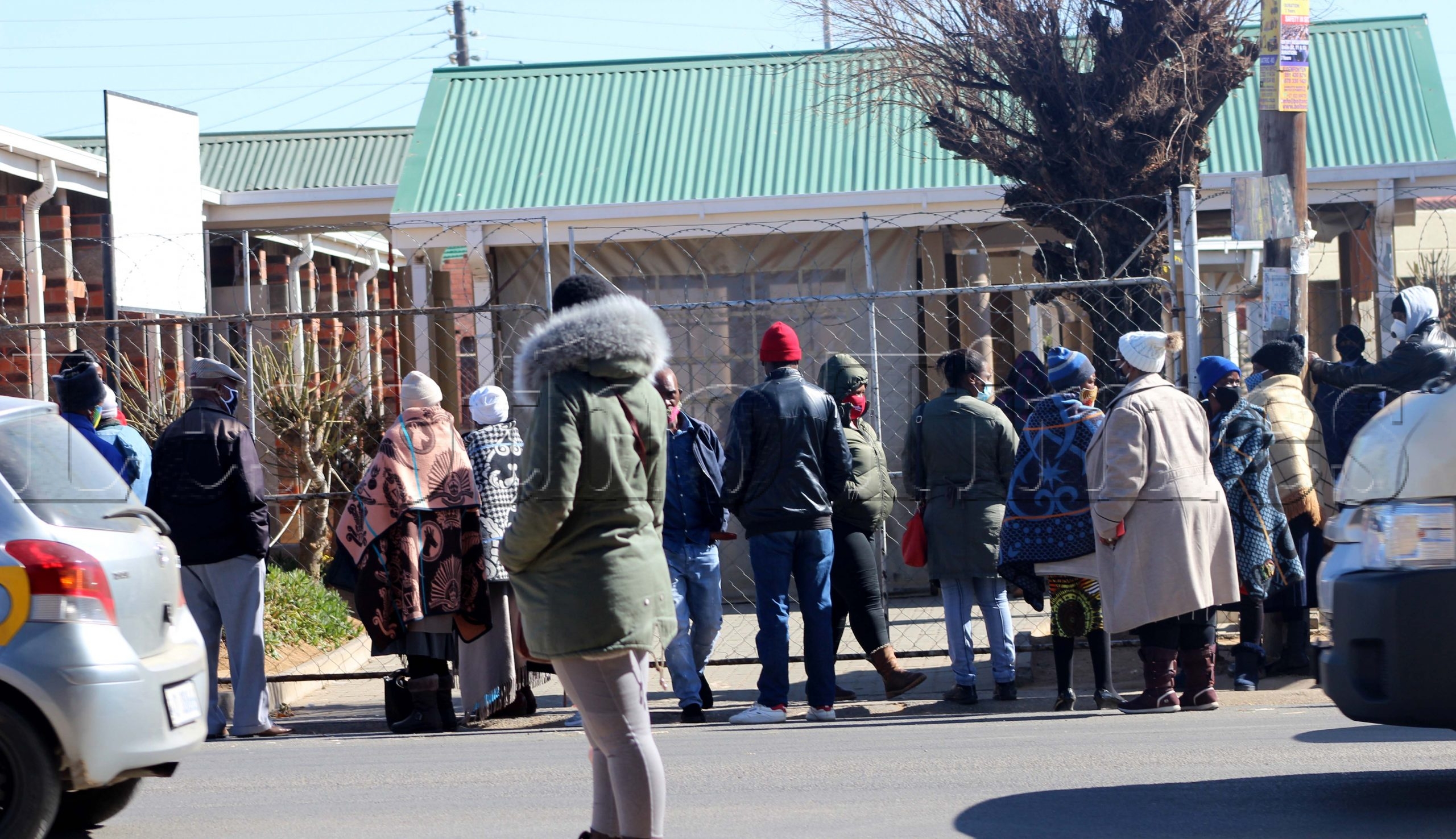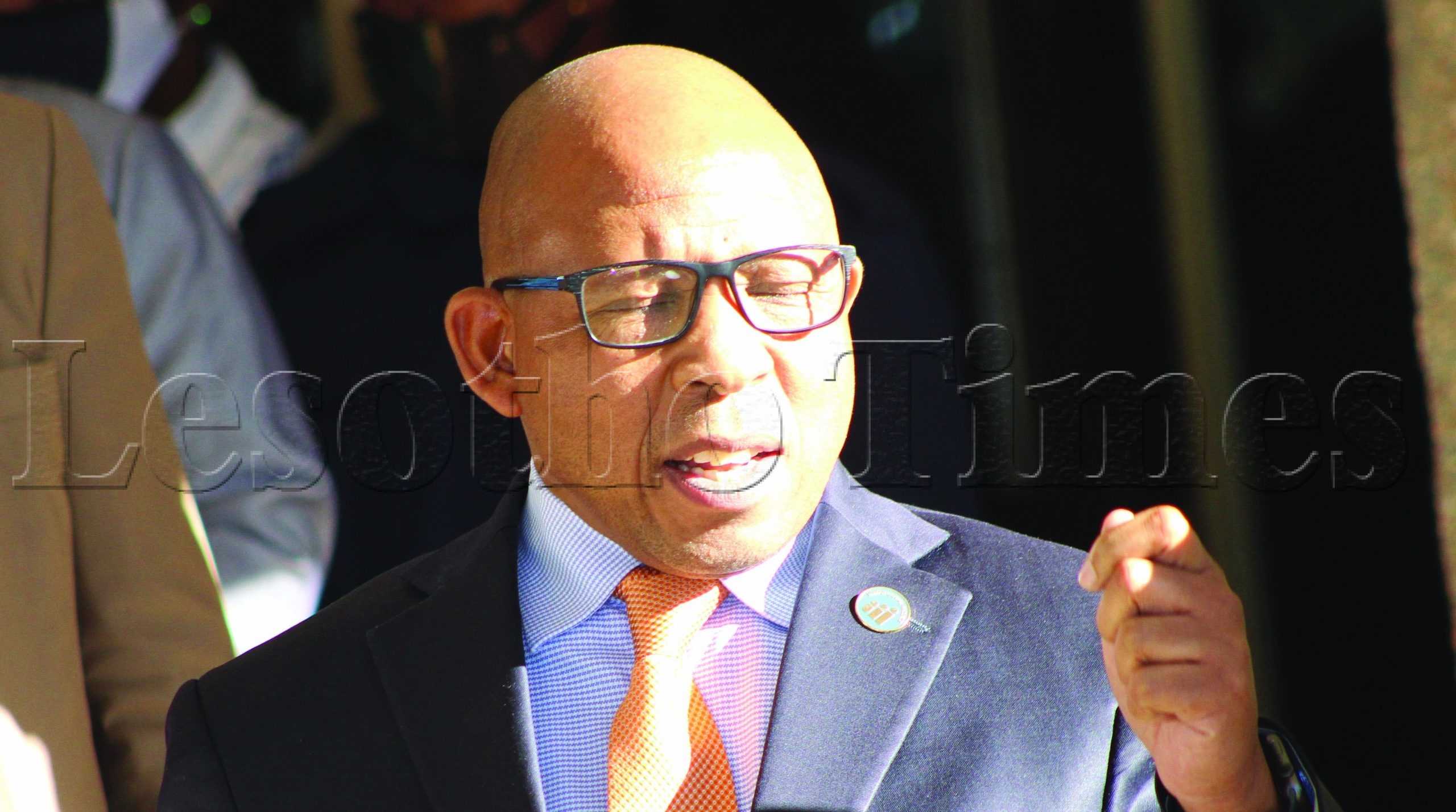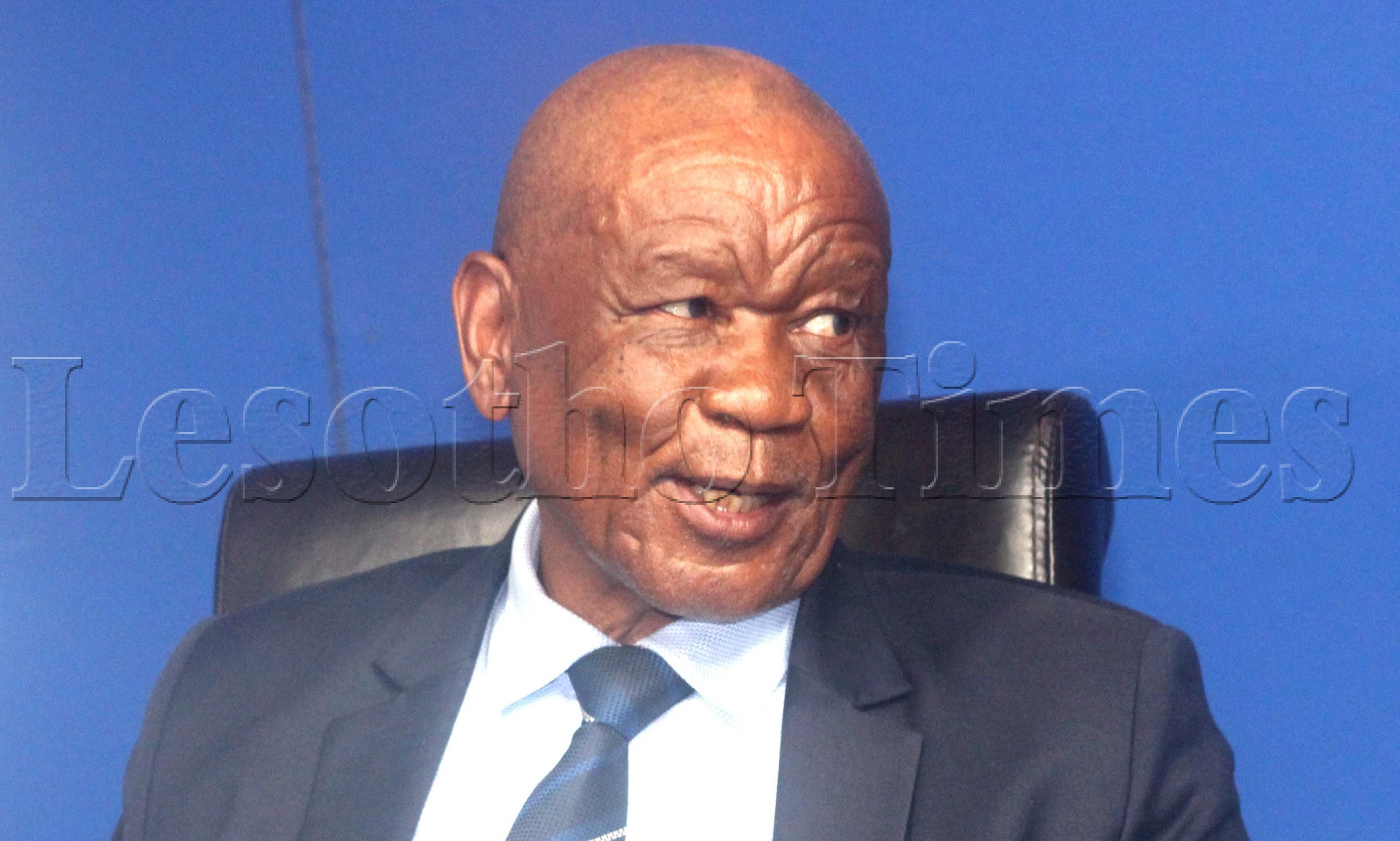- as Shaun Abrahams recommends his prosecution for defeating the ends of justice
- says he should be charged alongside Mokete and Lebajoa
Mohalenyane Phakela | Pascalinah Kabi
EMBATTLED Police Commissioner Holomo Molibeli and his trusted lieutenants, Deputy Police Commissioner (DCP) Paseka Mokete and Assistant Police Commissioner (ACP) Beleme Lebajoa, face a fresh legal battle after South African prosecutor, Advocate Shaun Abraham, recommended their prosecution for allegedly defeating the ends of justice.
Adv Abrahams, a former national director of public prosecutions (NDPP) at South Africa’s National Prosecuting Authority (NPA), was hired by the Lesotho government to prosecute various high-profile cases involving politicians, serving and former members of the security agencies.
Highly placed sources in the police and judiciary this week told the Lesotho Times that Adv Abrahams asked the Director of Public Prosecutions (DPP), Adv Hlalefang Motinyane to prosecute Commissioner Molibeli, DCP Mokete and ACP Lebajoa for defeating the ends of justice. This after the trio allegedly sabotaged the police investigation into the 14 June 2017 murder of former Prime Minister Thomas Thabane’s ex-wife, Lipolelo.
Mr Thabane and his current wife, ‘Maesaiah have been named as suspects in Lipolelo’s murder. Commissioner Molibeli and his allies have been accused by police sources of sabotaging the murder probe to protect the Thabanes. The sources said the probe was only revived early this year to get back at Mr Thabane for attempting to oust the police boss.
The sources said Adv Abrahams made the recommendation after meeting the former lead investigator in the Lipolelo murder, Senior Inspector Mphelehetse Khatleli, at the police headquarters in Maseru a fortnight ago.
According to the sources, the latest moves to indict the top police officers have resulted in a fresh war between them and DPP Motinyane who was already considering charging them for various other alleged crimes.
Some of these crimes include allegedly protecting ‘Maesaiah from prosecution for assaulting a Maseru man at the State House in January 2019.
So serious are the tensions between the police and DPP Motinyane that the latter is said to have hired private security details for her own protection. This despite that she is entitled to round the clock protection by members of the police’s Special Operations Unit (SOU). Although SOU members still guard her home in Maseru West, she has also hired a private bodyguard to watch over her at all times, the sources say.
“DPP Motinyane was warned by some police officers who are allies of the police bosses (Molibeli, Mokete and Lebajoa) against pursuing the charges against them,” a source said.
“She (DPP Motinyane) was told to drop the plans to charge them, failing which she will see for herself what will happen to her. She interpreted this to mean that her life would be in danger if she did not drop the charges.
“She is not taking the threats lightly and has therefore sought audience with the prime minister (Moeketsi Majoro) to discuss the issue. She has also hired private bodyguards to beef up her security,” the source said.
Several attempts to get a comment from DPP Motinyane proved fruitless over the past two weeks. She initially requested a meeting last Friday but later postponed, saying she would notify this publication when she was ready. Yesterday, she did not respond to requests for a meeting.
Adv Abrahams this week refused to speak about the sources’ claims that he had recommended Commissioner Molibeli and others’ prosecution for allegedly defeating the ends of justice in the Lipolelo murder probe. He referred all questions on the issue to DPP Motinyane.
“I do not know what you are talking about. Please engage the DPP (Motinyane) with all your queries Mr Phakela,” Adv Abrahams said.
However, the well-placed sources insisted that DPP Motinyane had resolved to charge Commissioner Molibeli and his lieutenants. This after a recommendation by Adv Abrahams who met with Snr Insp Khatleli at the police headquarters on 14 July 2020.
Snr Insp Khatleli led the Lipolelo murder probe from 2017 until he was ordered by Commissioner Molibeli to surrender the case to DCP Mokete in January 2020.
He was later transferred from Maseru to Mokhotlong in March 2020. The move has been condemned by some police sources as aimed at frustrating him.
It was also viewed as an attempt to steal his and his team’s thunder after they implicated Mr Thabane and his wife, ‘Maesaiah, in the gruesome murder.
‘Maesaiah is out on M10 000 bail while Mr Thabane is yet to have his day in court. It is not clear why the police have not yet arrested him despite repeated assurances by DCP Mokete that he will soon be arrested and appear in court alongside his wife.
ACP Lebajoa directed all questions to police spokesperson Superintendent Mpiti Mopeli.
On his part, Supt Mopeli said they had indeed sent some police officers to the DPP’s office to inquire about the January 2019 assault case against Commissioner Molibeli, ACP Lebajoa and ‘Maesaiah. He however, expressed doubts that DPP Motinyane was ever threatened by the police officers.
“After learning that there was such a case, we asked police officers from our intelligence department to go to the DPP’s office last week and inquire about the case because none of the police superiors knew about it before then.
“Normally when there is a case against police officers, it is reported to the LMPS command but this was not done in this instance.
“We sent the team to the DPP’s registry office and they were told that the file was being searched for before it could be given to them. We do not know who is behind the case and all I can say is that the LMPS command is investigating what the case is really about.
“I may not be in the picture as to what actually transpired at the DPP’s office. But logically speaking, how would she be threatened when the inquiry was done at the registry and not her personal office?
“I am not disputing that she could have been threatened but I have not heard that she has laid any complaint of being threatened. The officers who were sent there were intelligence officers who could not have carried guns to her office,” DCP Mokete said.
Meanwhile, DCP Mokete appeared to confirm that Adv Abrahams had indeed held a meeting with Snr Insp Khatleli over the Lipolelo probe.
He told this publication that details of Adv Abrahams’ meetings with police officers “remain confidential”.
“I cannot respond to your inquiries because those issues are part of an ongoing investigations,” DCP Mokete said yesterday.
According to the sources, Snr Insp Khatleli was called to the 14 July 2020 meeting at the police headquarters to shed light on the Lipolelo probe.
“He (Snr Insp Khatleli) spilled the beans on the police bosses to Adv Abrahams,” said one source.
“He revealed that investigations had proceeded smoothly under then police commissioner Molahlehi Letsoepa. Everything changed after Ntate Thabane appointed Molibeli as the police commissioner in August 2017.
“Snr Insp Khatleli told Adv Abrahams that Molibeli and his team frustrated the probe to protect Ntate Thabane and his wife, Maesaiah from prosecution. Adv Abrahams then recommended the prosecution of Commissioner Molibeli and other senior officers like DCP Mokete and ACP Lebajoa for allegedly defeating the ends of justice,” the source said.
Snr Insp Khatleli refused to comment on the issue.
Last week, he confirmed to the Lesotho Times that his investigation team “did not enjoy the much-needed support from the police command” after the ouster of Mr Letsoepa.
“I don’t want to go into details surrounding the investigations but I can confirm that twice during the investigations, we went without support from the police boss.
“Three months into the probe, we had already established a pool of suspects and anticipated that we would have completed the case the following month.
“We were now at a point where we needed to get solid evidence to tie the suspects to the crime. However, the vehicle and other resources we had been allocated such as airtime were withdrawn for 10 months.
“When SADC intervened (in December 2017), we had already made a breakthrough but investigations were frustrated by the lack of support from the police command,” Snr Insp Khatleli said.
Contrary to recent claims by DCP Mokete that he took over the probe after realising that Snr Insp Khatleli and his team were afraid of investigating high profile figures like the then premier and his wife, Snr Insp Khatleli said the Lipolelo probe was a straightforward investigation which could have been concluded a long time ago if they had resources at their disposal.
“It is not true that the case was taken away from us because we were afraid to arrest high profile individuals. This was one straightforward murder case which could not be completed soon enough because we did not have resources.
“We had to dig deep into our own pockets to finance investigations to an extent that we sent informants transport money for us to meet. We did some of these things to maintain our own credibility in the eyes of the informants as they were sceptical about our roles and impartiality as the police.
“In every case I have worked on, my intention is to always do well so that justice prevails. I don’t do it for a promotion. Every case needs enough evidence linking the suspects to the crime before going to court,” Snr Insp Khatleli said, adding that he had previously put other high-profile criminals behind bars.
Apart from the Lipolelo issue, the top cops face various other charges individually and collectively.
Commissioner Molibeli and ACP Lebajoa could also be prosecuted for abuse of office after they allegedly protected ‘Maesaiah from being prosecuted for allegedly assaulting a Maseru man, Thesele Matela, at the State House on 2 January 2019.
This after Mr Matela had accidentally phoned Mr Thabane. Mr Matela is alleged to have been later “kidnapped” by the police and taken to State House in the boot of a car. He then received a heavy beating at the hands of ‘Maesaiah and her friends.
The request to prosecute ‘Maesaiah and Messrs Molibeli and Lebajoa was submitted to DPP Hlalefang Motinyane by Commissioner Molibeli’s subordinate, ACP Motlatsi Mapola, a fortnight ago.
In addition to the possible criminal charges, the Lesotho Police Staff Association (LEPOSA) has also petitioned Prime Minister Moeketsi Majoro to suspend Commissioner Molibeli to facilitate investigations into the latter’s alleged criminal misconduct, maladministration and abuse of power.
The criminal charges stem from a perjury case which a junior officer, Snr Insp Haleeo Leluma, filed against Commissioner Molibeli earlier this year.
Snr Insp Leluma wrote to then Police and Public Safety Minister, Lehlohonolo Moramotse, on 1 April 2020 accusing Commissioner Molibeli of making false claims in his answering affidavit to a court case Insp Leluma had filed to stop the police boss from transferring him from Maseru to Qacha’s Nek.
The junior officer had alleged that Commissioner Molibeli had sought to transfer him from Maseru to Qacha’s Nek on the basis that there had only been one senior officer responsible for that district yet that was not the case.
Former Prime Minister Thomas Thabane had attempted to fire Commissioner Molibeli on the basis of Snr Insp Leluma’s letter to Mr Moramotse.
Mr Thabane said he had been advised that Commissioner Molibeli’s claims were false because there were three senior officers at the level of senior superintendent and two senior inspectors in Qacha’s Nek instead of the one senior alleged by the police boss. Mr Thabane accused Commissioner Molibeli of having committed perjury.
On the other hand, DCP Mokete has been charged with sexual assault and this was on the recommendation of Adv Motinyane. A junior police officer, Inspector ‘Makatleho Mphetho had laid a sexual assault against DCP Mokete. The matter will on 21 August 2020 be allocated a hearing date in the Maseru Magistrate Court. DCP Mokete is out on free bail.
The post Molibeli woes mount appeared first on Lesotho Times.



















